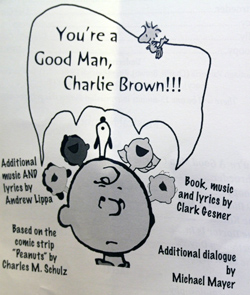By Donald H. Harrison


EL CAJON, California–At Purim carnivals to be held on Sunday, March 16, throughout the world, children will dress up as such adult characters as Esther, Mordecai, Ahasuerus and the wicked Haman, and through the device of masquerade, will once again tell how Esther and Mordecai saved the Jews of old against the evil designs of Haman.
Though coincidental, there was an interesting turnaround on Saturday, March 15, at the Stagehouse Theatre at Grossmont College, where six very talented adults (drama students) got to dress up as some of the world’s most favorite fictional children — Charlie Brown, Sally Brown, Lucy Van Pelt, Linus Van Pelt, Schroeder–and a fabled dog, Snoopy, in a production of You’re A Good Man, Charlie Brown!!
Directed by Susan Jordan-DeLeon and based on the “Peanuts” comic strip by Charles M. Schulz, a philosophy of life, as normally revealed in four-panel cartoons in the daily newspapers, was brought to life on stage by a well-balanced cast including Benjamin Roy (Charlie), Al Foggiano (Linus), Lief Corbell (Schroeder), Alexandra Lee (Lucy), Danielle Gulihur (Sally) and Nick Eiter (Snoopy).
Very enjoyable music direction by Ron Councell and additional choreography by Chelsea Nicole Lapp made this two-hour production (with one 15-minute intermission) a memorable occasion. The show will be offered again on four performances Thursday evening through Saturday evening, March 20-22, with tickets available at the college’s box office, (619) 644-7267
It was the first musical that my five-year-old grandson, Brian, ever attended (along with his father, David), and I imagine he will long remember scenes of Snoopy lying atop his dog house, or sitting astride it imagining he is an air duel with the Red Baron. He’ll perhaps remember Charlie Brown as the boy with a lot of unnecessary doubts about himself; Lucy as the domineering, and according to her own survey, “crabby” big sister to blanket-carrying Linus; Schroeder as a musical genius; and Sally as a home-spun philosopher, who offers us such truths as it’s difficult for her to know the past because “I wasn’t there!”
If Brian doesn’t remember those scenes, perhaps he’ll remember Snoopy and Sally in dances of pursuit of a big rabbit, with live, but off-stage, music played by the quintet of Ron Councell, Alyze Dreiling, Bill Lambden, Lauren Michelle Madrid and Ramon Hernandez. As the chase went on, with the aid of music cues, Sally and Snoopy switched and danced in the guise of such characters as James Bond and Indiana Jones. What fun!
The musical by Charles Gesner with additional music and lyrics by Andrew Lippa and dialogue by Michael Mayer is loosely constructed — a series of skits, really — all of which culminate in proving to Charlie Brown that despite his doubts, he is indeed a good man, and childhood really is a good time.
Purim shpiels and carnivals similarly carry a reassuring message, that no matter how many evil people like Haman (or his predecessor Amalek) may rise up against us, if we keep our wits and integrity about us, we can prevail. At Temple Emanu-El which I attend with another grandson, Shor, who is soon to become a bar mitzvah, Rabbi Devorah Marcus and Rabbi Emeritus Martin S. Lawson suggested that sometimes religious stories make us uncomfortable because they go against our sense of ethics. Not only Haman and his sons were slaughtered at the end of the Purim story, but so also were people who, so far as we know, committed no evil.
In the Torah, Haman’s ostensible ancestor Amalek was cursed by God because he and his people attacked the women and children and the disabled who were the stragglers in the procession led by Moses across the Sinai to the Promised Land. Despicable as that might be, it did not warrant–and the Israelites did not pursue–wiping out the entire nation, including women and children, even though God seemed to desire such action. Rabbi Marcus said she is glad that the Israelites kept their sense of integrity and ethics, even if it meant trouble in future generations, and especially in the generation of Haman.
Rabbi Lawson told of an interesting custom practiced by some Jews of Iran–the country where the Purim story was said to have taken place. To symbolically wipe out the memory of Amalek, they place his name and that of Haman on the soles of their shoes, and as they walk around the names literally are ground into the dust.
I like that story. It gives me hope that someday Snoopy by some magic will knock that cursed Red Baron’s airplane right out of the sky.
*
Harrison is editor of San Diego Jewish World. He may be contacted at donald.harrison@sdjewishworld.com